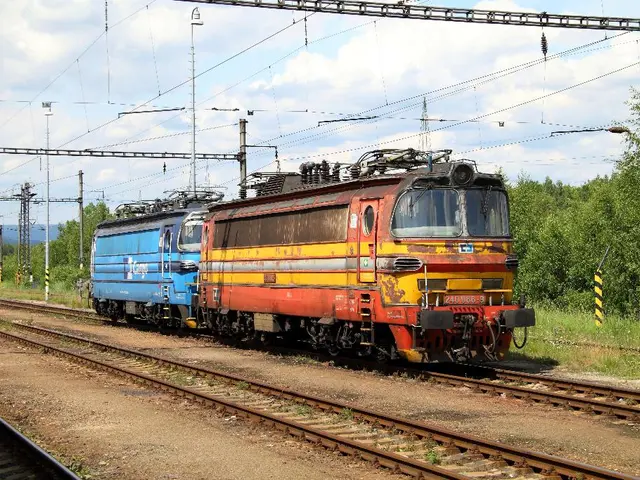Kazakhstan Moves Forward with Joint Ventures in Renewable Energy Sector
🔥🌿 Sustainable Energy Push Across Kazakhstan, Azerbaijan, and Uzbekistan 🌿🔥
Astana - Kazakhstan is ramping up its green energy efforts, considering regional and global partnerships to deepen its sustainable energy supply infrastructure. The commitment to a greener future was reaffirmed at the third Green Energy Advisory Council ministerial meeting, held on April 4 in Baku.
Spearheaded by Azerbaijan's President Ilham Aliyev, the meeting zeroed in on the Green Energy Corridor initiative. Kazakhstan was represented strongly, with Deputy Minister of Energy Sungat Yesimkhanov and KEGOC Chair Nabi Aitzhanov in attendance.
Kazakhstan has been championing low-carbon solutions, with a focus on the utilization of associated gas and innovative projects that generate green hydrogen. One such attempt is a trilateral agreement signed among Kazakhstan, Azerbaijan, and Uzbekistan. A key part of this agreement is the construction of a submarine high-voltage cable across the Caspian Sea, to be a part of the Green Energy Corridor project.
KEGOC, the system operator of Kazakhstan's unified power system, is spearheading the implementation of this unique project - the construction of a deep-sea cable stretching along the Caspian Sea's seafloor. This trailblazing underwater route will form a crucial component of the energy infrastructure, fostering close cooperation among Kazakhstan, Uzbekistan, and Azerbaijan.
At the meeting, technical specifications for the feasibility study were presented, with funding planned through donor grants. The feasibility study is expected to lay the groundwork for the implementation of the underwater cable, contributing significantly to regional energy security and decarbonization efforts.
The Green Energy Corridor project represents an ambitious regional collaboration, marking a significant stride in the transition to greener, cleaner energy sources. In 2025, the project has gained significant traction, with key developments in cross-border energy infrastructure and collaborative agreements:
- A feasibility study collaboration was established among the Asian Development Bank (ADB), the Asian Infrastructure Investment Bank (AIIB), and the three nations. The aim is to interconnect energy systems and foster institutional frameworks for cross-border electricity trade, with a focus on renewable energy transmission.
- The initiative envisions an energy transmission network linking Central Asia to Europe, potentially including underwater cable routes like the Caspian Green Energy Corridor or the Black Sea Cable mentioned in ADB’s broader regional plans. However, details about the Caspian underwater cable are yet to be fully disclosed.
- Parallel initiatives are underway to export renewable energy (wind, solar) from resource-rich Central Asia to Europe, in line with the European Union's green energy goals.
Geopolitical and technical complexities, along with market integration, will be key challenges to address in the coming months. Nevertheless, the momentum lies in institutional preparation and feasibility assessments, with broader regional transmission goals linked to European demand.
- The deepening of sustainable energy supply infrastructure in Astana, Kazakhstan, is being pursued through regional and global partnerships, with a focus on the construction of a deep-sea cable across the Caspian Sea.
- At the third Green Energy Advisory Council ministerial meeting in Baku, the feasibility of constructing this underwater cable was discussed, with funding potentially coming from donor grants.
- The environmental-science and finance aspects of this project were also highlighted, as Kazakhstan, Azerbaijan, and Uzbekistan work towards reducing carbon emissions through innovative green hydrogen projects and the utilization of associated gas.
- Industries such as science and energy are playing crucial roles in the realization of the Green Energy Corridor project, with KEGOC, the system operator of Kazakhstan's unified power system, leading the implementation of the underwater cable component.
- As the Green Energy Corridor project gains traction, it reaffirms the commitments of Kazakhstan, Azerbaijan, and Uzbekistan to a greener future, and marks a significant step in the transition to cleaner, renewable energy sources, with potential connections to European energy systems.








